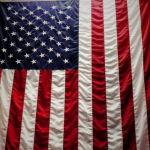The tariff madness has directly affected my work life over the past several months.
A lot of what we sell at the Big Box — stuff people need to fix and maintain and improve their homes — comes from overseas. My crew is the final step in a global supply chain that puts all of those products on the shelves for people here in Chester County. So as soon as the tariff-obsessed candidate won the election, the company began stocking up on everything that might soon become harder to get under his imagined (then announced, then imposed, then “paused,” then re-imposed, etc.) tariffs.
For me and my team, this has meant handling an endless stream of higher-than-usual freight flow while also trying to find a way to cram it all into the same size building. Instead of a six-week supply of product on hand, we’re now dealing with a six-month supply of a great deal of our internationally sourced inventory. This is and has been exhausting — a Christmas rush that lasts all year.
And so, for personal reasons, I’m paying attention to every news report about tariffs and the retail biz. Like this one, from NPR’s Morning Edition last week, “Can retailers eat tariffs without price hikes? Walmart, Target, Lowe’s face pressure.”
Betteridge’s Law of Headlines applies here — whenever a headline asks a question, the answer is “No.” But that piece included a very strange comment from NPR’s Alina Selyukh, discussing the story with host Brian Cornell:
CORNELL: We mentioned the political pressure on retailers. What are they afraid of?
SELYUKH: Well, they don’t want to find themselves in Walmart’s shoes. Last week, Walmart got called out by Trump by name, after executives said higher tariffs will lead to higher prices as soon as this month. This was a pretty direct comment from the world’s largest retailer. You know, this is a chain that has lots of muscle to pressure suppliers. It puts laser focus on keeping prices low for its shoppers. Many of its shoppers are often on a budget. And executives said Walmart is absorbing some tariff costs. So are its suppliers. But the chain says it will start losing money if it absorbs the full weight of the tariffs, so it’s passing on those costs to shoppers. And this prompted a direct attack from President Trump. He wrote an online post to say Walmart should stop blaming tariffs and, in fact, should, quote, “eat the tariffs.” He also added China should eat some tariffs. But just to say the basics, the way the system works, it’s American businesses that import the goods that get the tariff bill.
So Walmart and other retailers are now facing much higher costs for much of what they sell and they have two choices. They can either raise their prices to account for those higher costs, or they can “eat” the tariffs — selling products at a loss and costing the company tens or hundreds of millions of dollars.

That doesn’t seem like a difficult choice for any retailer that wants to stay in business, but Selyuk says it is, because if those retailers do raise prices, they risk being “called out by Trump by name.”
That’s the weird bit. What does it matter if Trump — the guy who personally and arbitrarily created this problem with his weird and dumb tariff hobby — says mean things about you in late-night posts on his personal social media platform? How could that possibly be meaningful enough to weigh against the loss of hundreds of millions of dollars that would come from “eating” his tariffs and selling a third of your inventory at a loss?
It’s because of what Selyukh knows but doesn’t say — what she and all of NPR and all of every other mainstream news agency knows but doesn’t say. When the thin-skinned Mad King gets peevish and starts calling you out by name, that signals that he is about to abuse his powers through some vindictive act of lawless retaliation.
The context for Selyukh’s otherwise-absurd comments about Walmart — the context that makes sense of what she’s saying — is things like this Morning Edition story from a few days later, “Harvard’s Steven Levitsky says Trump administration acts as authoritarian government.” That’s an interview piece in which a guest is invited to say that which business reporters like Selyukh are not allowed to say. The hook for that interview is Trump’s flagrant abuses of power in his attempts to attack Harvard University and, by extension, all of higher education in America.
Here is another NPR report on that explaining why even large, powerful, deep-pocketed institutions that follow the law “don’t want to find themselves in Walmart’s shoes,” “Trump again blasts Harvard over international students as judge blocks revocation.”
Trump’s latest attack against Harvard comes two days after a federal judge issued a temporary restraining order blocking the administration from being able to revoke the university’s ability to enroll international students.
The university had argued that the Trump administration’s revocation was a “blatant violation of the First Amendment” and punished the school for rejecting “the government’s demands to control Harvard’s governance, curriculum, and the ‘ideology’ of its faculty and students.”
Is there any legal or constitutional basis for a president having or using the power of the presidency to “revoke the university’s ability to enroll international students”? No. Unambiguously no.
Will this president do that anyway? Yes. Will he also abuse his power in other lawless, unconstitutional ways to continue to attack Harvard and other institutions and individuals he “calls out by name”? Yes. Yes he will. And the harm he may do to them may even exceed the cost of selling half your inventory at a loss.
The point here is that everyone knows this. Everyone knows that this president abuses the powers of his office and is constantly threatening to abuse those powers further against anyone who doesn’t “eat the tariffs” or fire all the non-white professors or whatever cruel and capricious thing the misfiring synapses in his syphilitic brain come up with next.
Which means we’re all already “in Walmart’s shoes.” No matter what we do or don’t do, we’re already there.
The abuse of power by this president is a given. It is assumed.
The only question is whether or not it will also be accepted.
















